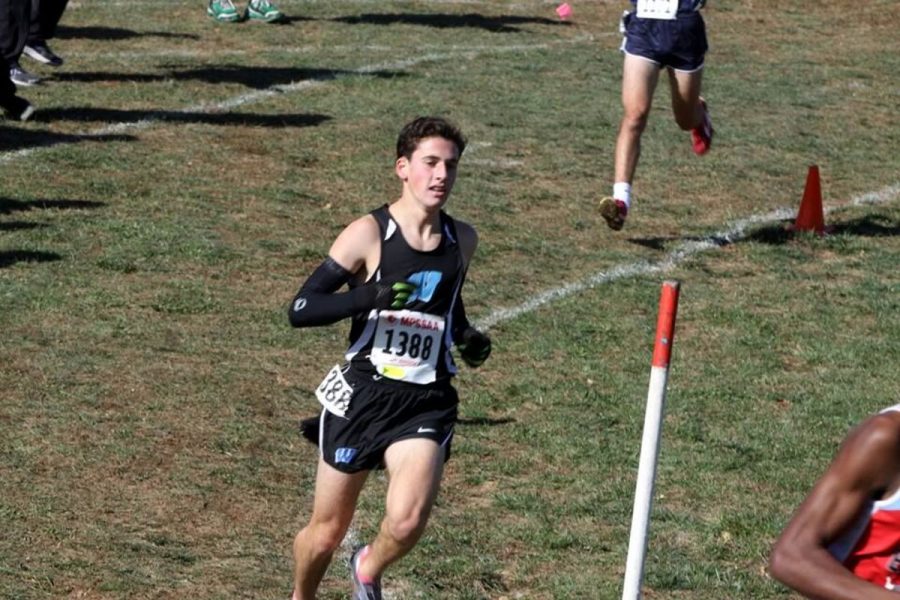Runners transfer skills from cross country to track
Junior Aaron Bratt runs at the Cross Country 4A State Championships Nov. 11. Bratt runs Cross Country and both indoor and outdoor track, making for a variety of different workouts and mental preparation. Photo courtesy MoCoRunning.
January 18, 2018
For Whitman’s elite runners, racing isn’t limited to just a few months of the year. Instead, they run year-round for Whitman’s cross country and indoor and outdoor track teams.
Many of Whitman’s top runners take part in both track and cross country, including junior Obi Onwuamaegbu and sophomore Alicia Lauwers.
For Onwuamaegbu, cross country is more mentally taxing than track.
“For the five kilometer race, there’s a certain mental element you need to bring in to every race because every race is different,” Onwuamaegbu said. “There are different courses, different hills or different ways to run each race.”
The longest track event is the 3200 meter run, which is just two thirds of the length of a five kilometer—or 5000 meter—cross country race.
Despite the shorter distance, some track races can seem longer, Lauwers says.
“I run distance, so for me track races feel a lot longer because you do multiple laps while in cross country it’s just one big loop,” Lauwers said. “I feel like it takes a lot more mental power for me to get through a race around a track.”
Onwuamaegbu, however, feels that his track season requires less concentration.
“I’d say you wouldn’t require as much focus for track,” Onwuamaegbu said, “The events are just that much shorter.”
Whitman standout runner Ben Gersch (‘16) disagrees.
“The main difference between track and cross country is that you have to be smarter when you race in track,” Gersch said. “In cross country you can just run on feel, but in track you always have to be aware of your positioning during a race.”
Gersch ran cross country and outdoor track for four years at Whitman, but never ran indoor track.
“The main reason I didn’t run indoor is that it’s hard to compete at a high level year-round,” Gersch said. “With cross country, you have the summer to train and prepare for racing in the fall. With outdoor track, it’s more difficult to train well when you have to race a lot indoors, so I took the winter season off to better prepare for spring.”
Taking a season off paid dividends for Gersch, who now runs track and cross country at Washington University in St. Louis.
Due to the wide variety of events, practices for track are much more diverse than cross country, where everyone runs the same distance at each meet, Onwuamaegbu says.
“For cross country, there’s more unified workouts where people will more or less be doing the same thing,” Onwuamaegbu said. “For track, if you’re a sprinter, you’ll be doing more strength-based stuff, as well as working on your explosiveness and doing sprinting starts. Distance runners will generally do the same workouts that we did in cross country.”
For cross country runners that are also sprinters for track, the main difference is the workouts.
“Distance runners, though they need to be strong, they get their strength from running, more so than being in the weight room,” coach Stephen Hays said. “Sprinters on the other hand really need to get into the weight room. So coming from cross country to track as a sprinter, you’re obviously getting in the weight room a lot more.”
Lauwers, who mainly runs the longer track events, finds that track practices are more taxing than those of cross country.
“Track workouts are in shorter distances, but they feel more difficult because it’s a lot of repeated exercises,” Lauwers said.
Aside from practice, Onwuamaegbu finds it’s easier to dial in for a race during track season.
“For track,” he said, “when you step on the oval each time, you know what you need to do.”











